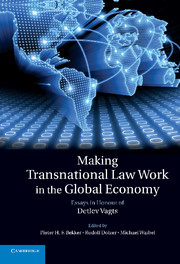Book contents
- Frontmatter
- Contents
- List of contributors
- Foreword: the transnationalism of Detlev Vagts
- List of cases cited
- List of abbreviations and acronyms
- Introduction: a Festschrift to celebrate Detlev Vagts' contributions to transnational law
- 1 Detlev Vagts and the Harvard Law School
- 2 Constructing and developing transnational law: the contribution of Detlev Vagts
- I International law in general
- 3 ‘Hegemonic international law’ in retrospect
- 4 Textual interpretation and (international) law reading: the myth of (in)determinacy and the genealogy of meaning
- 5 The changing role of the State in the globalising world economy
- 6 Sources of human rights obligations binding the UN Security Council
- 7 Is transnational law eclipsing international law?
- 8 Participation in the World Trade Organization and foreign direct investment: national or European Union competences
- 9 From dualism to pluralism: the relationship between international law, European law and domestic law
- 10 Transnational law comprises constitutional, administrative, criminal and quasi-private law
- 11 Founding myths, international law, and voting rights in the District of Columbia
- 12 The tormented relationship between international law and EU law
- 13 International law scholarship in times of dictatorship and democracy: exemplified by the life and work of Wilhelm Wengler
- II Transnational economic law
- III Transnational lawyering and dispute resolution
- Bibliography of Detlev Vagts
- Index
13 - International law scholarship in times of dictatorship and democracy: exemplified by the life and work of Wilhelm Wengler
from I - International law in general
Published online by Cambridge University Press: 17 November 2010
- Frontmatter
- Contents
- List of contributors
- Foreword: the transnationalism of Detlev Vagts
- List of cases cited
- List of abbreviations and acronyms
- Introduction: a Festschrift to celebrate Detlev Vagts' contributions to transnational law
- 1 Detlev Vagts and the Harvard Law School
- 2 Constructing and developing transnational law: the contribution of Detlev Vagts
- I International law in general
- 3 ‘Hegemonic international law’ in retrospect
- 4 Textual interpretation and (international) law reading: the myth of (in)determinacy and the genealogy of meaning
- 5 The changing role of the State in the globalising world economy
- 6 Sources of human rights obligations binding the UN Security Council
- 7 Is transnational law eclipsing international law?
- 8 Participation in the World Trade Organization and foreign direct investment: national or European Union competences
- 9 From dualism to pluralism: the relationship between international law, European law and domestic law
- 10 Transnational law comprises constitutional, administrative, criminal and quasi-private law
- 11 Founding myths, international law, and voting rights in the District of Columbia
- 12 The tormented relationship between international law and EU law
- 13 International law scholarship in times of dictatorship and democracy: exemplified by the life and work of Wilhelm Wengler
- II Transnational economic law
- III Transnational lawyering and dispute resolution
- Bibliography of Detlev Vagts
- Index
Summary
Introduction
Detlev Vagts has carried out much research on international law during the Nazi period, including on Wilhelm Wengler and his fate during that time. In this Festschrift in Detlev's honour, a focus on the life and work of Wilhelm Wengler, an international law scholar who stood in close contact with the German resistance movement to National Socialism, is particularly appropriate. The academic context in which Wengler was working demonstrates the options open to German international law scholars after 1933. These ranged from genuine enthusiasm for National Socialism, over academic and personal adaptation to the ‘new realities’ and resort to internal or external emigration to insurgency. Wengler's life also exemplifies how post-war scholarship in Germany and abroad evaluated the attitude of German scholars before 1945.
Studies, doctoral thesis and scholarly activities at the Kaiser Wilhelm Institute of Comparative and International Private Law and the Kaiser Wilhelm Institute of Comparative Public Law and International Law
Wilhelm Wengler was born on 12 June 1907, to working-class parents in Wiesbaden. After attending secondary school, he studied law and political science at the University of Frankfurt/Main from 1927 until 1931. In Frankfurt, he also passed his First State Exam with distinction, and also met Hans Lewald, who later became his doctoral supervisor. In 1931 he obtained his doctorate in law magna cum laude with a thesis on the primacy of international law, as well as his doctorate in political science summa cum laude with a thesis on double taxation.
- Type
- Chapter
- Information
- Making Transnational Law Work in the Global EconomyEssays in Honour of Detlev Vagts, pp. 222 - 242Publisher: Cambridge University PressPrint publication year: 2010



